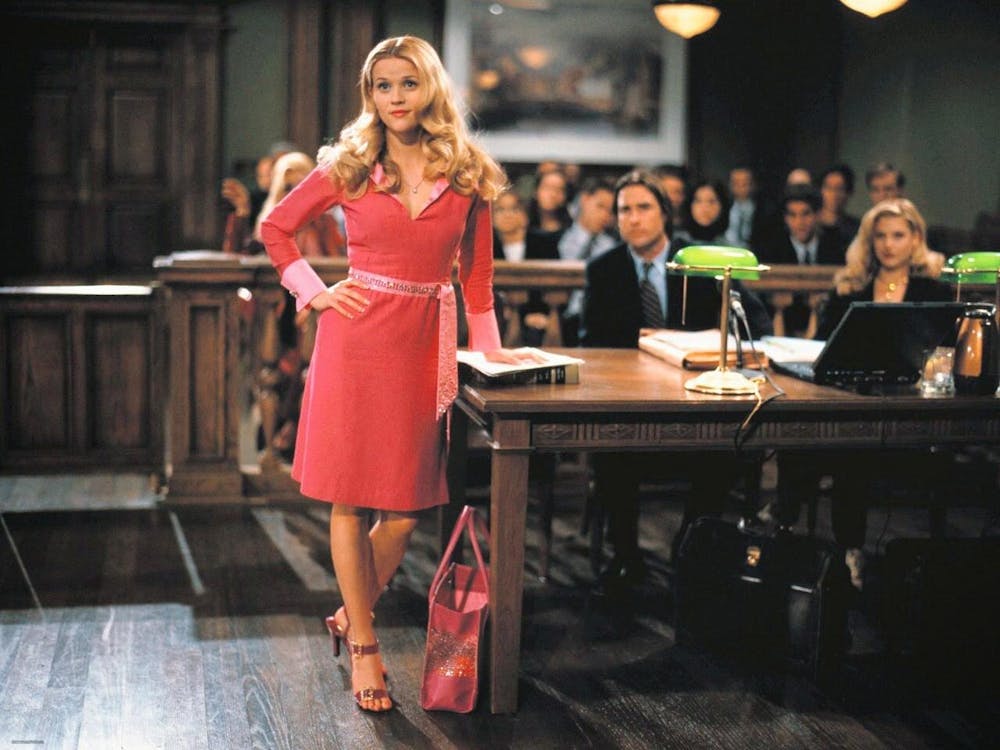Editor's note: All opinions, columns and letters reflect the views of the individual writer and not necessarily those of the IDS or its staffers.
If you look up the 2001 movie “Legally Blonde” on your preferred search engine, you’ll likely see it described with two familiar words: “romance” and “comedy.”
I won’t go so far as to say Google is wrong — but it’s not exactly right. Sure, there are romantic and comedic elements, but neither of those words captures the heart of what makes it such a great movie.
Let me be clear: my issue with the term rom-coms isn’t about the movies themselves, it’s about how broad and limiting the label can be. The term “rom-com” tries to encompass such a wide range of films when it sometimes fails to describe them accurately.
Take Legally Blonde. Calling it a “rom-com” feels like an oversimplification. It’s not that the label is wrong, but it’s incomplete.
When Elle Woods first decides she wants to go to Harvard Law School and makes it clear that she is serious, her friends and even her academic advisor, waste no time helping her achieve her dream. Her sorority sisters keep her focused while studying and they time her for practice LSATs. When her results arrive, they are the first ones to know. When she scores high enough on the LSAT to get into Harvard, they put her on their shoulders and carry her through the foyer of the sorority house in a celebration of silly string and applause.
There’s something so beautiful about how her friends rally around Elle to support her dreams. It shows the power of female friendship and the importance of having a strong support system. It showcases how empowering female friendships should be, proving that success is even sweeter when shared with those who believe in you.
This theme continues as Elle goes to Harvard, particularly in her interactions with Paulette, her beloved nail tech. Elle teaches her how to “bend and snap,” and in my absolute favorite scene, Elle also empowers Paulette to get her dog back from her horrible ex-boyfriend.
In court, Brooke Taylor-Windham is the defendant of the case Elle is chosen to assist her professor in defending. She is one of Elle’s sorority sisters and someone Elle deeply admires. When Brooke confides in Elle her alibi, a secret that could ruin Brooke’s reputation, Elle keeps this to herself, even though sharing it could have helped her win points with her professor and her team, as well as helping them win the case.
The title of “rom-com” makes it seem like the film is all about Elle and her quest for love, with her law school journey being the backdrop for her romantic endeavors. Although Elle’s intention of going to Harvard to win back her awful boyfriend was misguided; to reduce this story to just its romantic value seriously undercuts the real meaning.
Even Vivian, Elle’s rival from the beginning, eventually comes around to seeing Elle for who she really is, someone of intelligence and character. Notably, this rivalry has nothing to do with who either these women are and everything to do with Warner, Elle’s ex and reason for Harvard, who, at the beginning of the school year, was dating Vivian. Once he is out of the way, Elle and Vivian become better friends than either of them could have ever envisioned.
The story is a masterful reversal of the “dumb blonde” stereotype, flipping it on its head in the most triumphant way. Elle Woods walks into Harvard with her signature pink wardrobe, a little dog in tow and a head full of fashion knowledge — and from the moment she enters, she’s underestimated. But instead of changing who she is to fit in, Elle leans into her individuality and proves that femininity and brilliance are not mutually exclusive.
Her transformation isn’t from “shallow” to “smart,” it’s from someone who defined herself through others’ expectations to someone who reclaims her identity on her own terms. Elle doesn’t become powerful by abandoning her personality; she becomes powerful by realizing it was never the problem. The world just told her it was.
By the end of the film, Elle doesn’t win because she was lucky or because of a romantic twist. She wins because she’s clever, empathetic, hard-working and unafraid to be herself. That’s not a love story. That’s a coming-of-age journey. That’s empowerment.
So, yes, Legally Blonde has romance. And yes, it’s funny. But calling it a “rom-com” feels like calling a steak a snack because it’s served with a smile. It may look light on the surface but it’s rich with substance.
It’s a story about the power of women supporting women. About fighting stereotypes and proving your worth. About friendship, identity, resilience and yes, about love. But not just the type between romantic partners. It’s about the kind of love that exists between best friends, sisters, and, perhaps most importantly, the love you learn to have for yourself.
Because at its core, Legally Blonde isn’t just about Elle Woods getting the guy or delivering iconic one-liners, though she does both spectacularly. It’s about a woman who challenges expectations, redefines success on her own terms and inspires those around her to embrace their own strength, support one another and celebrate the friends that empower us all to be our true selves.
Ainsley Foster (she/her) is a junior studying Elementary Education.






